#surplus value
Video
Dude who makes $250 million a year tells people should work for the love of it
#tiktok#WGA#billionaire#media#capitalism is a scam#CEO#aflcio#workers rights#surplus value#union workers#workers vs capital#workers#labor vs capital#labor rights#skilled labor#capital vs labor#labor movement#labor movements#labor#collective action
3K notes
·
View notes
Text
Marx’s theory of value (re divergence of value from price) explains the foundation of surplus profit, which is significantly related to the unprecedented wealth of contemporary moguls, and its association with technological advancements/ increased productivity— eg in industrial production, specifically improvements in machinery, more productive factories. With related technological improvements, more productive units become the measure of price (exchange value). But these technological improvements are not instantaneous — eg because all branches of production are not the same. Thus there are varying degrees of productivity. And the least productive initially influences market price/ exchange value. Hence surplus profits for higher productivity, while market price fluctuates above market value. However, after a certain point, surplus profits “equalize” with average profits via competition, market price gravitates closer to market value, and the rate of profit becomes the same for capitals across the board. Again.. this presupposes that re- production of means of subsistence/ labor/ society is determined by production of surplus value (profits / rent) and the “law of market value”.
Finally, Marx’s examination of surplus profit notes how the law of market value creates a “false social value”, based on exchange value instead of value, that exploits society in terms of consumption/ consumers. For me, this offers an important theoretical foundation for organizing exploited workers at the point of consumption in addition to organizing at the point of production. And not only against capitalist producers but against the landlords as well; particularly with present, even more exorbitant rents and related surplus profits.
#Marxism#Marx#value theory#law of value#value#value form#exchange#exchange value#commodity#money#price#market value#market price#capital#profit#rent#surplus value#surplus profit#commodity production#capitalist commodity production#capitalism#socialism#communism
1K notes
·
View notes
Text

#exploitation#workers#wage slavery#wages#slavery#slavetothewage#surplus#surplus value#jerktrillionaires#jerkmillionaires#jerkbillionaires#interesting facts#factsnfunnypics#smiley face#random facts#fun facts#facts#fact of the day#fact#ausgov#politas#auspol#tasgov#taspol#australia#fuck neoliberals#neoliberal capitalism#anthony albanese#albanese government#eat the rich
60 notes
·
View notes
Text

Labour theo(r)y of va(lue)
#196#marxist theory#communism#socialism#labour theory of value#labor theory of value#labor rights#surplus value#am i tubling right rn?
119 notes
·
View notes
Text
This excellent text has been compiled from a thread on Twitter which can be found here:
“A McDonalds hamburger costs $2.09 at the register. McDonalds internal documents show that the raw materials (patty, bun, etc.) cost $0.34. A McDonalds employee makes $11/hr on average with a shift manager making $15/hr. Shifts are 8 people on average. That means McDonalds pays $77 + $15/hr in wages to a shift (total $92). The average McDonalds makes $2.7 million/year in sales. That is $308/hour, or roughly 147 hamburgers every hour at $2.09.
Subtracting the wage of the workers ($92) and cost of materials ($49.98), this means there is $166 in surplus value accumulated every hour by the capitalist.
If we take the value of the 147 hamburgers and distribute it among the workers who completed them and placed them into circulation, we get $258.02 ($308-$49.98) divided among 8 workers for $32/worker/hour as compared to their $11/hr wages.
The rate of exploitation of the McDonald’s workers is thus, when the raw materials are taken as constant capital and not variable capital, is 32:11, roughly 3:1.
This means, that of each hamburger, if 34 cents is raw material and the sale price is $2.09, there is $1.75 attributable to the work of the McDonalds employees in the store. We can divide that value among the 8 workers, and we’d come up with 21 cents per hamburger created by each one.
However, let’s look a little more carefully, not merely from the point of view of the McDonald’s capitalist, but from the point of view of the imperialist.
The beef patty in a McDonald’s hamburger weighs 1.6 ounces. According to the corporation, the meat is a combination of chuck ($4/lb), sirloin ($9/lb), and round ($7/lb). The prices of these meats is from the US beef markets.
We can take the average of these three prices: $6.50/lb. For the amount contained in a hamburger (1.6 ounces), this comes to roughly .65 cents ($6.50/16 = .40).
As you can see, this is more than the entire value of the raw materials in the McDonald’s hamburger. Even if they receive a twenty-five per-cent discount for bulk operations, that’s still 49 cents per hamburger.
One of the top countries supplying beef to McDonalds is Brazil, which shouldn’t be a surprise: the Brazilian ranching industry supplies a huge amount of worldwide beef, and grows it on land assarted from the Amazon.
A Brazilian livestock handler makes 16 reals/hr, which is $3.21 USD. Brazilian beef costs a mere $1.76 and $2/lb. We can see why. The price of Brazilian beef is so much lower because the Brazilian worker’s wage is so much lower.
Why is that?
Imperialism.
The labor market of Brazil is artificially depressed by fascists like Bolsonaro, who are put into power by US interests to keep prices low. US monopoly capital also destroys the quality of life in imperialized countries because this is how the socially necessary labor time is determined for reproducing the labor force.
If the Brazilian beef costs 34 cents for 1.6 ounces while the reproduction cost of the Brazilian ranch hand is $3.21 an hour, then we may establish a ratio - roughly $3/hr to 30 cents or $1/hr to 10 cents. If the ranch hand made $11/hour just as the metropolitan workers do, this would be an increase of 3 and a half times, increasing the Brazilian beef cost to $1.19 for 1.6 ounces.
If we wished to maintain the price equilibrium by which the hamburger is sold at $2.09, this would require an equalization of wages between the metropolitan worker and the peripheral worker. That is to say, because the hamburger is worth $1.75 in labor ($1.75+$0.34=$2.09) from the metropolitan worker, we must equalize the $1.75 in metropolitan labor with the $0.34 in peripheral labor.
If we were to divide these into two equal parts, that is, $1.04 worth of peripheral labor crystallized in the meat and $1.04 worth of labor in the metropole for the finishing of the meat into a final product, that is a change of $0.71 in favor of the peripheral worker.
For each hamburger made, the metropolitan worker is paid 3x the wage of the peripheral worker. The metropolitan worker cooking the burger on the grill, assembling the worker, dealing with angry customers, and selling the burger; the ranch hand is enduring near-slave conditions on the Brazilian plain.
The metropolitan worker is directly paid 3 times more for their labor, the hamburger’s cost is depressed for all metropolitan workers, the metropolitan capitalists (the monopoly capitalists) provide other social safety benefits to keep the class consciousness of the metropolitan workers from developing, and they also concentrate the high-waged, final finishing work for products and the management positions within the metropole.
These are the wages of imperialism.
Lots of quote tweets etc. demanding I account for credit, interest payments, advertising, salaries for HR and executives, franchising fees, rent, machinery, etc.
I didn't factor in any of the standard constant capital valuations for a reason: it obscures the point, which is the law of unequal development and the imperialist forced underdevelopment of the periphery. The pay for the entire cavalcade of non-productive or marginally productive executives, HR reps, advertising, etc., etc., all comes out of the 11 hamburgers sold after the first 7.
So do the salaries of the CEOs.
Rent actually isn't a factor for a McDonalds because the corporation owns the ground. The franchisee pays the corporate office rent, but the corporate office pays no one.
These costs are all marginal - as are the electricity and water costs and the degradation of the grill, etc.
The grill itself costs around $3,000 but can make an untold number of hamburgers, imparting to the hamburger a mere fraction of a fraction of a cent.
The typical annual Mcdonalds power bill is $40,000. That works out to $4.5/hour or 3 cents per burger at the average rate of 147 burgers per hour.
The cost of upper management is mostly faux frais which can be eliminated, or non-productive labor which is parasitic, etc. There is still PLENTY of value to cover the necessary work at higher levels.
And obviously there are things other than burgers made at a McDonalds - each product has a different individual rate of exploitation for the workers (for example, the soda is hugely exploitative and mostly mark-up).
Important, however, is that most of the profit is not from MARKUP (charging more than a thing is worth) but from THEFT (stealing and refusing to compensate the legitimate labor of the worker).”
102 notes
·
View notes
Text
“Nowadays, one no longer says 'You have a soul and you must save it,' but:
'You've got a sexual nature, and you must find out how to use it well.
''You've got an unconscious, and you must learn how to liberate it.
''You've got a body, and you must know how to enjoy it.
''You've got a libido, and you must know how to spend it,' etc., etc.
This compulsion toward liquidity, flow, and an accelerated circulation of what is psychic, sexual, or pertaining to the body is the exact replica of the force which rules market value: capital must circulate; gravity and any fixed point must disappear; the chain of investments and reinvestments must never stop; value must radiate endlessly and in every direction. This is the form itself which the current realization of value takes. It is the form of capital, and sexuality as a catchword and a model is the way it appears at the level of bodies. Besides, the body to which we constantly refer has no other reality than that of the sexual and productive model. It is capital which gives birth in the same movement to the energetic of labor power and to the body we dream of today as the locus of desire and the unconscious.”
- Jean Baudrillard, Forget Foucault, p. 39
#jean baudrillard#forget foucault#circulation of desire#capitalism#liquid capital#liquidity#sexuality#means of production#unconscious desire#academic quote#poststructuralism#postmodernism#value#surplus value
8 notes
·
View notes
Text

And you can bet there was some MAGAt laughing at the boss's joke, too stupid to know his labor was being robbed as well.
1 note
·
View note
Text
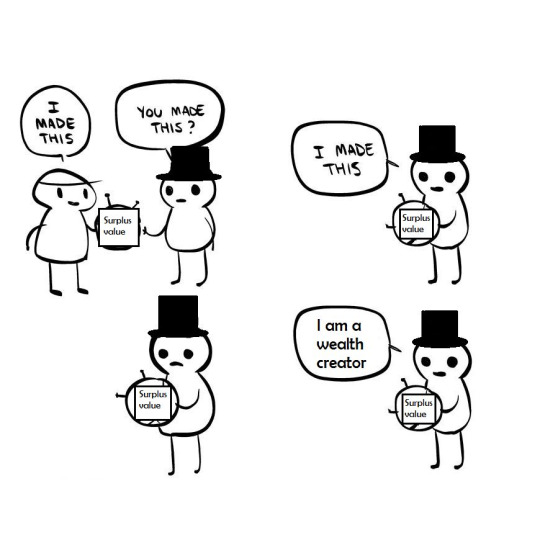
This week has brought out a theme in memes, a meme theme.
0 notes
Text
When terms such as output and productivity are employed, the image which often arises is of an increase in the physical quantity of goods and services. But the production of material wealth is not the aim and driving force of capitalism. It is solely the accumulation of money in the form of profit.
#workers struggles#wsws#socialist equality party#capitalism#class war#tim gurner#surplus value#productivity
1 note
·
View note
Text
Moneyed Society: The Current Grand Global Affliction
“For the love of money is the root of all evils, and some in their desire for it have strayed from the faith and have pierced themselves with many pains.”
- 1 Timothy 6:10
War. Theft. Inflation. Bankruptcy. Unemployment. Poverty. Unjustified punishment. Corruption. Fraud. Shortage. Famine. Taxes. Death. Extinction. You are likely concerned about some, if not all, of these problems. They have continued for years – decades – centuries – millennia. The world has about ½ a billion underweight people despite having enough food to feed 11 billion people. Even the United States of America, one of the richest countries in the world per person, has over ½ a million homeless people despite having over 11 million vacant homes. People are not the only organisms suffering; over 1 million species are going extinct: doomed to be gone from our world at this rate. Something has gone horribly wrong.
Indeed, it is only ONE thing: exchange, the establishment of debt through trade as measured by money.
You see, when you need something in modern society, you usually must trade for it. If you cannot give that compensation in money, a desired object, or a promise thereof, you do not receive no matter how much you might need what you seek. In many cases, such as housing, health care, and highest education, prices tend to overwhelm consumers. Oddly enough, the need for money itself is a redundant feedback loop: you need money because your suppliers need money because THEIR suppliers need money and so on. There must be a reason for this insane flow.
When money or a promise to pay back is given to a modern business, that business has profits – also known as surplus value or proceeds – between the money/debt of what it got (or will get) from the consumer and what it gave (or will give) to its suppliers in order to provide/operate. Those proceeds are sometimes spent on building/investing in the physical assets (e.g. land, buildings, and machines) to produce more, but they can also be returned to the people who bought/financed the business. This is the core of capitalism, listed in the order of a Statement of Cash Flows. These financiers – also known as bourgeoisie or shareholders – buy businesses to create a mandate that the business must keep making proceeds to eventually give back to financiers as profit greater than what they put in. This means that every capitalist business tries to make as much profit as possible for the foreseeable future, getting the highest number of revenues from consumers minus expenses to suppliers possible. This habit makes businesses, consumers, and their suppliers disagree and create all kinds of conflict.
Think of a starving person. Unable or not allowed to reach a farm, they went to a marketplace and could not get food. Maybe natural events have caused a famine. Maybe the government has blocked that person’s racial or religious group from reaching food. Or maybe the very suppliers of food decided that the best way to maximize proceeds is to leave them out. Their prices have inflated so much that although people like the one in question are unable to afford the new prices, the consumers who do pay so much more that sales numbers remain much higher than the costs of production. Sad and desperate, the starving people seek any way to fix this problem. They might harass, steal, or even kill to stay alive and well. Because they feel insecure, they listen to any loud speaker who strongly casts blame: “That leader is at fault!” “That cultural group is at fault!” “That nation is at fault!” Hatred booms, and desperate people fight other people who might also suffer from all this.
When businesses operate for as much profit as possible, they could not care less about the resulting wreckage. We are threatened by the war industry that gets payments from hatred-fueled governments over and over again. The largest of these nations not only blow-up other countries, leaving doomed wastelands, but also stockpile nuclear weapons can do vastly more damage if unleashed. Oil, coal, and natural gas corporations also demolish the earth by yanking out valuable fossil fuels. Then, ecosystems full of animals and plants in those extraction sites collapse, consumers keep using old modes of commuting and warmth instead of better, healthier alternatives, and worst of all: the burned fuels make sun rays keep heating our planet in the chaotic, climate-changing greenhouse effect. Pollution in general is more lucrative from continued sales than recycling and resource conservation, so it continues. 2 industries of greedy businesses alone crumble our world and endanger us so much that we might all die off in a century if some miracle of biology happens.
Of course, smaller problems come from our capitalist economy based on increasing revenues and/or reducing expenses. Wages and salaries lack raises because they are not the ruling investors’ bottom line. People avoid low-paying jobs because inflated costs of housing and health care leave them bankrupt otherwise. Commuting distances stretch so much, cars fill entire streets because their sales make more money than bus tickets, train fares, and government spending. Work and driving take entire days because companies avoid paying additional full salaries. And politicians worsen or barely reduce these problems because the rich people behind all this fund their election campaigns. There is only one way to end this global cancer, and that is by everyone stopping proceeds, relieving debt, and going moneyless for good.
Contributors of the Moneyless Society (MoSo) advocacy charity have written other essays decrying the different kinds of pain debt dumps on us. MoSo Founder Matthew Holten has also written a book explaining the systems theory behind the failures of the monetary system and structures that can replace it after it is repealed by a critical mass of people. Dedicated members Amanda Smith and Zachary Marlow engage brilliant people in MoSo podcast episodes and a documentary in progress as of Winter 2023. I recommend you learn from as many of these as you wish.
#money#debt#trade#economy#resource based economy#Moneyless Society#plague#bad habits#surplus value#accounting#business#101#freedom
0 notes
Photo

3K notes
·
View notes
Quote
The unique character of the commodity labor power, which as value simply represents its costs of production, but which as use value is itself the source of the creation of new value, makes it possible for the exchange between the worker and the capitalist to simultaneously correspond to, yet contradict, the laws of commodity exchange; that this, the most important of all the acts of exchange, amounts in fact to the appropriation of alien labor, without exchange, although “under the semblance of exchange”. It is clear, however, that this semblance is a “necessary semblance”, insofar as capitalist production itself is the production of commodities, and therefore presupposes the laws of commodity exchange… Capital’s mode of appropriation, which is based on the propertylessness and expropriation of the worker, is neither a complete negation nor a “falsification” of the laws of free exchange, but is rather “their highest development”.
Roman Rosdolsky, “The Making of Marx’s Capital”, Vol. I, trans. Pete Burgess, London: Pluto Press, 1980, pp. 263, 265.
#Marxism#Marx#Rosdolsky#value theory#law of value#value#value form#exchange#exchange value#use value#commodity#labor power#capital#surplus value#commodity exchange#commodity production#capitalist commodity production#capitalism#socialism#communism
27 notes
·
View notes
Text
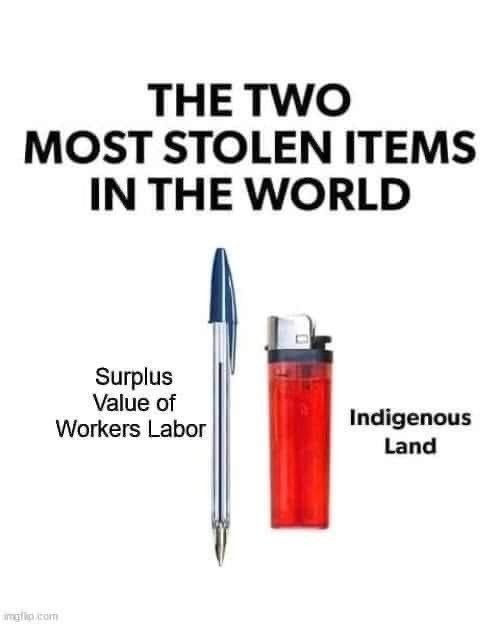
#stolen#items#2#world#earth#surplus value#workers labor#indigenous land#ausgov#politas#auspol#tasgov#taspol#australia#fuck neoliberals#neoliberal capitalism#anthony albanese#albanese government#eat the rich#eat the fucking rich#fuck the gop#fuck the police#fuck the patriarchy#anti colonialism#anti slavery#slavery#wage slavery#anti colonization#anti capitalism#antiauthoritarian
27 notes
·
View notes
Text
O que é a mais-valia de que falamos tanto?
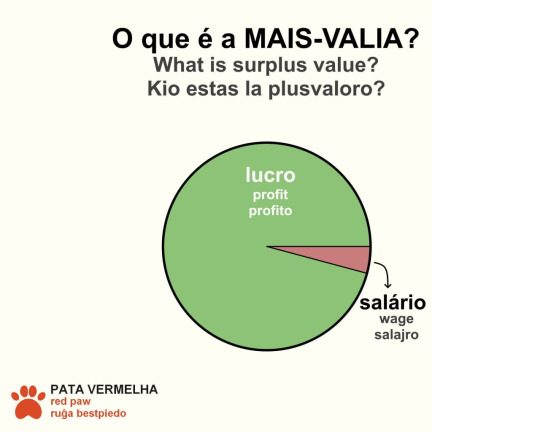
As pessoas dizem que temos inveja, ou que precisam do dinheiro para cuidar da empresa e pagar impostos, ou que o chefe merece mais dinheiro porque ele investiu.
Se o dinheiro é mesmo pra manutenção, por que vemos o chefe comprar um iate antes de melhorar o ambiente de trabalho? A pessoa diz em investiu nas máquinas, mas o dinheiro pra isso veio de onde? Dizem que estão arriscando os investimentos, mas como é fácil apostar pondo as pessoas pra trabalhar por você.
Mais-valia não é só pedir pra ganhar mais. A mais-valia é o valor que adicionamos ao produto, mas que fica com a empresa. Todo lucro é trabalho roubado.
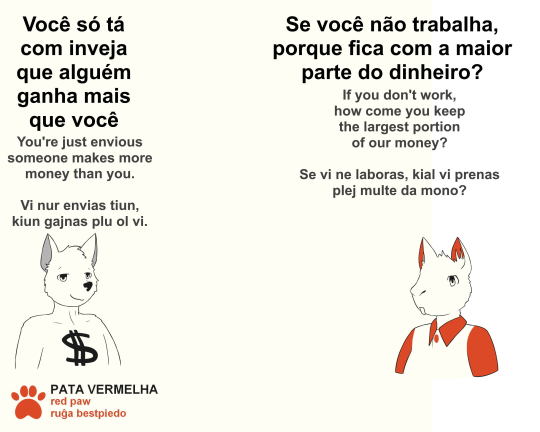


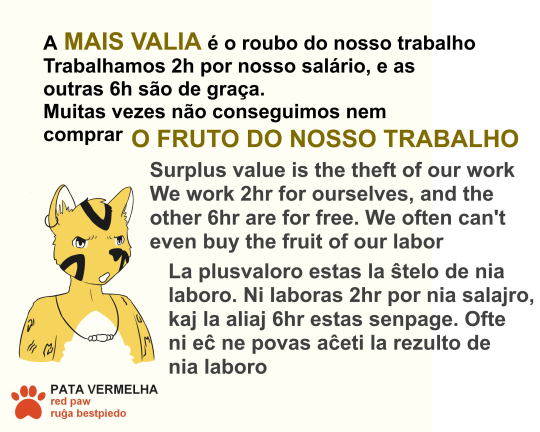
What's surplus-value?
People say we're envious, or that they need the extra money to maintain the company and pay taxes, or that the boss deserves to make more money cause they invested.
If the money really is used for maintenance, why do we see the boss buying a new yacht before improving the working conditions? They say they invested in the machines, but where did that money come from? They say they're risking the investments, but how easy is it to bet while you put others to work for you.
Surplus-value isn't just asking for a raise. Surplus-value is the value we add to the product, but that remains with the company. All profit is stolen labor.
Kio estas la plusvaloro?
Homoj diras, ke ni estas enviaj, ke bezonas la monon por bonteni la firmaon kaj pagi impostojn, ke la ĉefulo meritas gajni pli da mono ĉar ri investis.
Se la mono estas uzita por bonteni la maŝinojn, kial la ĉefulo aĉetas jaĥton malposte plibonigi la laborejo? Homoj diras, ke investis en maŝinoj, sed el kie venas tiu mono? Ili diras, ke riskas investante, sed veti kiam aliuloj laboras por vi estas tro facila.
Plusvaloro ne estas simple peti pli grandan salajron. Plusvaloron estas la valoron, kiun ni aldonas al produkto, sed kiu restas en la firmao. Ĉiu profito estas ŝtelita laboro.
0 notes
Text
Mehrwert
0 notes